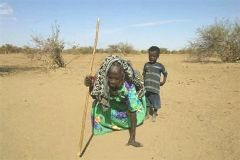Sudan, West in war of words over genocide charge
By William Maclean
NAIROBI, Sept 10 (Reuters) – Sudan and Western powers plunged into a war of words over Darfur on Friday, with Khartoum countering U.S. charges of genocide by saying Washington was playing electoral politics with a humanitarian crisis.
 Sudan’s Islamist rulers said a finding by U.S. President George W. Bush and Secretary of State Colin Powell of genocide in Darfur was “an isolated position” made in the heat of a presidential election to win African-American votes.
Sudan’s Islamist rulers said a finding by U.S. President George W. Bush and Secretary of State Colin Powell of genocide in Darfur was “an isolated position” made in the heat of a presidential election to win African-American votes.
“They should not use a humanitarian problem for political agenda,” Foreign Minister Mustafa Osman Ismail told Reuters during a visit to South Korea.
“We know that an election is going on. We know the political parties, the Republicans and Democrats, are competing for the votes of African-Americans,” Ismail said.
Rebels began an uprising in Darfur in February 2003 after years of skirmishes between mainly African farmers and Arab nomads over land and water. The government turned to Arab militias to help suppress the rebels.
The United Nations estimates 1.2 million people have fled their homes and up to 50,000 people have died from direct violence, starvation or illness in what it describes as the world’s worst humanitarian crisis.
OIL SANCTIONS
The United States declared on Thursday the violence in Darfur region amounted to genocide and urged the world to back an expanded African peacekeeping force to halt the bloodshed.
The move, raising the political temperature of efforts to end the crisis, has little legal import, analysts say.
But the determination may influence a U.N. Security Council debate on a U.S.-proposed resolution that threatens sanctions on Sudan’s budding oil industry, which pumps about 320,000 barrels per day, if Khartoum does not stop the abuses.
Britain backed its main ally by saying genocide may have occurred in Sudan, and supported Washington’s call for a United Nations investigation of abuses in the Darfur region.
But Chris Mullin, junior foreign minister, said London was wary of jeopardising progress that has been made in Sudan.
“My worry is that while we’re sitting around discussing whether genocide occurred, the Sudanese government could disappear back into its box again and it may make access to these desperate people very difficult,” Mullin said.
The rebels accuse Khartoum of arming Arab militia known as Janjaweed to loot and burn African villages. Khartoum admits arming some Arab militias but denies links to the Janjaweed, whom it calls outlaws.
At the United Nations, several U.N. Security Council members objected to the U.S. draft resolution’s threat of oil sanctions but said they supported the deployment of a larger African Union force in Darfur region.
China, one of Sudan’s oil customers, threatened to use its veto power against the resolution if changes were not made to the text.
U.S. Ambassador John Danforth, however, told reporters after a closed-door council meeting that he expected the draft to be adopted, perhaps next week and with some revisions.
The U.S. Agency for International Development (USAID), a key player in the Darfur aid effort, said the crisis was destabilising the impoverished region.
Andrew Natsios, the USAID administrator, said on a visit to Nairobi that peace accords aimed at ending a separate, older war in Sudan’s south formed the basis for a Darfur settlement.
“That (southern) civil war has now been transferred to Darfur. What we want to avoid is having another war in Darfur that lasts for 22 years. We simply cannot have the people of Darfur go through that kind of suffering. It is destabilising the region,” he told reporters.
Meanwhile, in Darfur, at Arara camp for displaced people, villagers said they were too scared to return home and were just waiting for a chance to flee to neighbouring Chad.
They said marauding Janjaweed have attacked them in the camp and stolen their food — provided by the World Food Programme.
“If we don’t have security here, how can we be expected to go to our villages?” said Ahmed Khatir Arbabe. “We would rather go to Chad if security is not improved,” he said. (Additional reporting by Jack Kim in Seoul, Katherine Baldwin in London, Katie Nguyen in Nairobi and Robert Waweru in Darfur)
